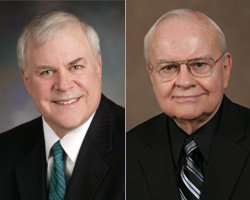
Good news about the distinguished Florida State University College of Music hit a particularly high note this spring.
When it comes to research published in the Journal of Research in Music Education (JRME)—the premier publication for scholarly inquiry in the music education profession—a recent study calls FSU the single most influential institution since 1990.
That study, undertaken and described in a paper by the University of Illinois at Urbana-Champaign, found that more than 25 percent of the 418 articles published in JRME between 1990 and 2005 came from music educators who received their doctorates from FSU.
The University of Illinois review of scholarly contributions to JRME appears in the Winter 2007 edition of the Bulletin of the Council of Research in Music Education. The article begins with a reference to FSU’s "most influential" status and ends with even higher praise:
"In summary, the impact of Florida State University on the research agenda of the music education profession over the past 15 years is consequential. The work of the faculty, graduates and students of Florida State has served as an example that might provide a model for other graduate institutions granting graduate degrees in music education to emulate."
That affirmation is music to the ears of Don Gibson, FSU’s College of Music dean.
"During collegiate promotion and tenure processes, research published in JRME is given the greatest weight in the evaluation of scholarly productivity for music educators," Gibson said. "The disproportionate presence of our doctoral students, alumni and faculty in this most prestigious journal speaks volumes about the quality of music education at Florida State."
Gibson points to the dominant presence of FSU as evidence of the continuing productivity of its faculty members over many years. "The contributions to JRME, both by FSU faculty and our alumni in music education, have undoubtedly shaped the direction of research in the discipline," he said.
Clifford Madsen agrees. A member of the FSU faculty since 1960, he is the Robert O. Lawton Distinguished Professor of Music and the coordinator of the music education, music therapy and contemporary media programs.
"I’ve been very fortunate to find myself among a talented and dedicated group of College of Music faculty and students who demonstrate such high levels of productivity and excellence," Madsen said. "Since coming to FSU 47 years ago, I have attempted to encourage all of my associates to develop a ‘love affair’ with research. It is a distinct pleasure for me to see the fruition of their efforts continuously appear in our profession’s premier journal."
Not content to see the College of Music rest on its laurels, Gibson emphasized the need to stay abreast of music education trends and continue to provide a leadership role to others in the profession.
"For example, FSU’s development of the ‘Continuous Response Digital Interface’ in the late 1980s provided a way to measure aesthetic responses to music for both musicians and listeners," he said. "Since that time, however, many additional measuring devices have been developed by our Center for Music Research in studying music perception and cognition. We are always looking for ways to ‘push the envelope.’
"It is appropriate to note that there are more than 600 accredited music programs in the United States, and our College of Music is ranked among the very best," Gibson said.
To learn more about the philosophy behind FSU’s approach to music education, and for a description of the various degree programs offered, visit the College of Music Web site at www.music.fsu.edu/music-ed.htm.




